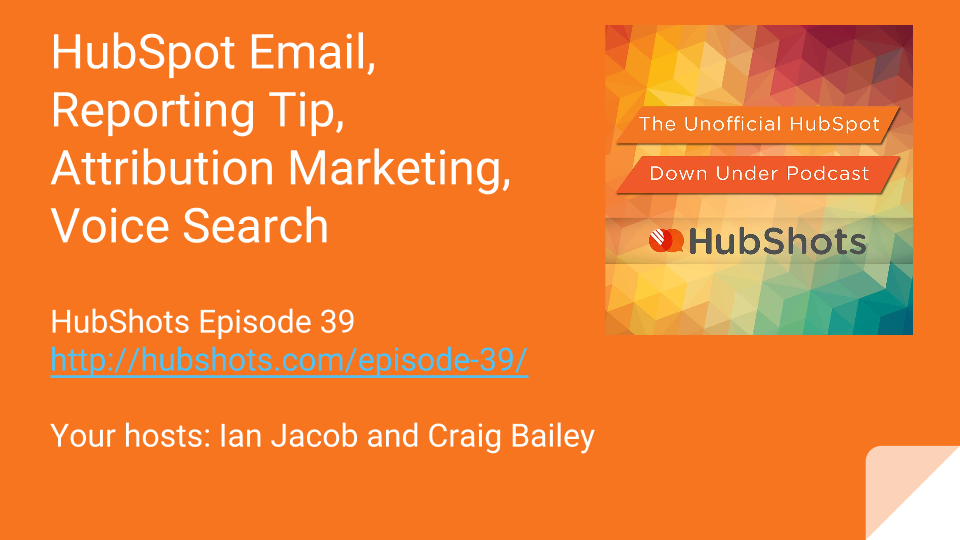Episode 270: How to be Efficient with HubSpot across Sales, Marketing & Service
HubShots Episode 270: How to be Efficient with HubSpot across Sales, Marketing & Service This edition we dive into: Thoughts for 2022 Having...
Recorded: Tuesday 21 June 2016
This week we’re again testing adding the show notes in a range of formats including Soundcloud, SlideShare, YouTube and Google Slides.
Click here to join the HubShots WhatsApp group.
Listen on Soundcloud:
Watch on YouTube:
You can view the Google slides on Slideshare below:
Or read through the transcript along with the links and slides:
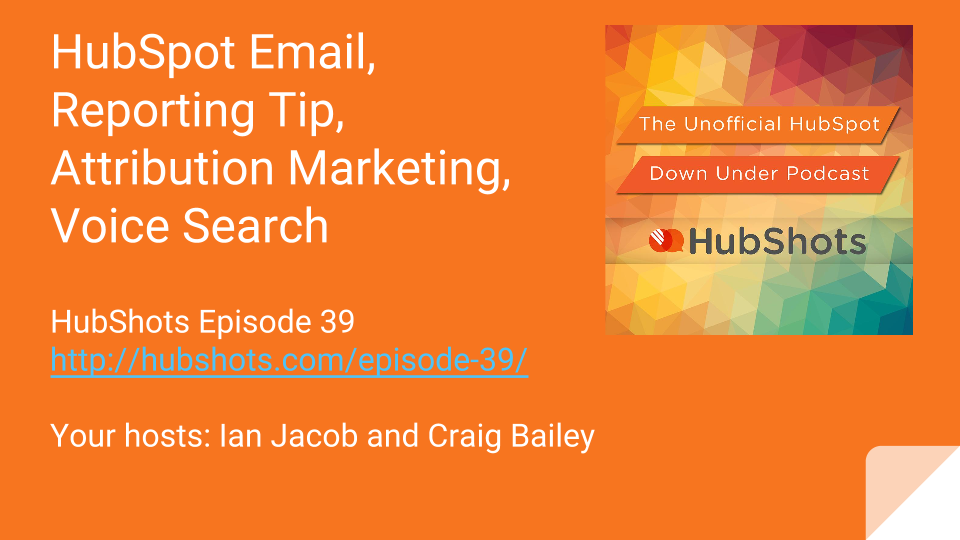
Craig: Welcome to HubShots, episode 39. My name's Craig Bailey from XEN Systems and joining me today is my co-host Ian Jacob from Search & Be Found. Ian, how are you?
Ian: Very good, Craig. How are you today?
Craig: Really well.

Ian: Now welcome to all our listeners. Now this is a podcast for marketing managers that are either considering using HubSpot or are currently using HubSpot and we have lots of great tips, tricks, and lots of great information that you can action and take away to make your life better.
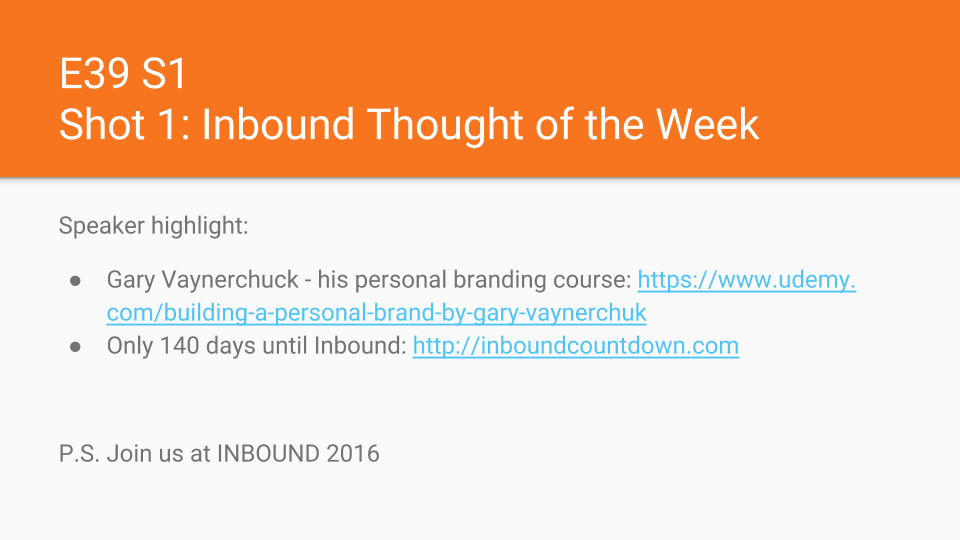
Craig: Yeah, tons to get through today. And we'll start with our Inbound Thought of the Week, which is shot one, something we like to go through each week about Inbound.
Ian: Yes, and this week, you've actually done this. You showed me this course, Craig, from Gary Vaynerchuk and it's about personal branding and I think it's fantastic. I'd love to do it.
Craig: Yeah, it's well worth doing and the reason we're mentioning it is because Gary is one of keynote speakers at Inbound this year. I've been following him kind of on and off over time and I haven't had like a strong opinion of him, but then I did his course. He's got a two-hour course on Udemy or Udemy or whatever...I'm not sure how it's pronounced, but it's U-D-E-M-Y. We've got a link in the show notes and make sure you get a voucher, by the way, a discount voucher. You can always get their courses at reduced rate. But yeah, he did this one on personal branding. The reason I'm mentioning it is because you get a good insight into Gary, but also I would recommend marketing managers do this. So if you think, "Oh, this is just about me, me, me, making my personal brand," well, sure, that's part of it, but it's actually what all marketing for brands should be. So if you can understand the principles and then be applying it, well, to yourself and to your role, that's a big advantage. And the other thing about personal branding is we're actually finding that in marketing, it's much more about, shall we say, the character of the brand.
Ian: Yes.
Craig: You know, companies are not just these faceless organisations anymore. They've gotta actually be putting themselves out there.
Ian: That's right. And we spoke about this last week on your emails, about sticking a picture about yourself and not sending emails from marketing@[yourbusiness].com.
Craig: It's all about personal connection. So yeah, I really like Gary Vaynerchuk and just remember, it's only 140 days to Inbound. We'd love to see you there and we'd love to meet up with you.
Ian: Yes, and we've even created a WhatsApp group for people. So if you want to join in on that WhatsApp group, let us know. Fill in the form and let us know and then we'll add you to the group.
Craig: All right, moving on to shot two, HubSpot Tip of the Week. Now I'm embarrassed to say, Ian, I didn't know about this.
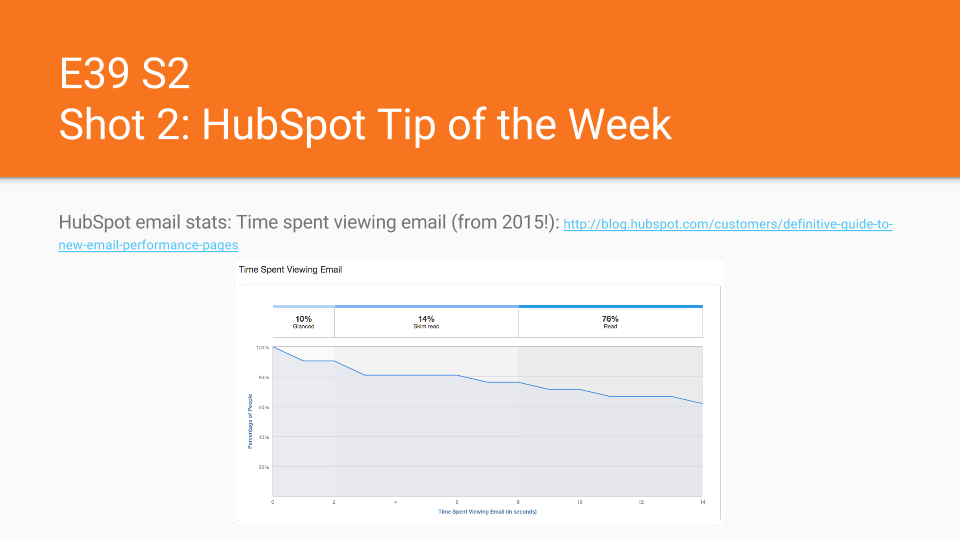
Ian: Yes, and I knew about it. I thought you did, Craig. And this has to do with email stats, right? So when you logged in and you're looking at your email stats, there's this very cool graph about time spent email so it kind of breaks it down into people who glanced at the email, they skim-read it, or they actually read it, and it gives you a nice little graph with kinda like the percentages. And I have shown this to many people and they're like, "Wow, that's amazing." And I never realised you didn't know about it, Craig.
Craig: Well, the reason...I kind of pride myself of knowing the product really well and so whenever I come across something like this, because I was going through some email reports and I was like, "Oh, what's this graph? Oh, that's really handy." Because it's not actually on the first tab.
Ian: No, it's not.
Craig: You actually gotta dig into people that have opened the email and see stats on them.
Ian: Yes.
Craig: I was like, "Oh, what's this? This must be new. This is fantastic." So I looked it up, they announced it like the start of last year. It's been 18 months ago. I was like, "Well, you know, I've never seen it," or maybe I had seen it but not appreciated it and if that's me, then maybe there are some of our listeners who are in the same boat, so check it out.
Ian: So I think the key with this is just to understand over time, understanding how people are interacting with your emails or engaging with them. I think that's the key thing that you will understand from looking at this graph and these metrics.
Craig: I think it's really useful actually because I was looking at some of our emails and how some of them do have good read...what shall we call it...time spent.
Ian: Time, yes.
Craig: Whereas others where it's really glanced and just flicked through. So it's another one of those ways to test your emails, because even if they didn't click through, you actually do get an indication of how they engaged. If a lot of them are actually reading it, the fact that they didn't click through might not that bad. They're actually engaged and then that's actually actionable. You can use that.
Ian: Yes.
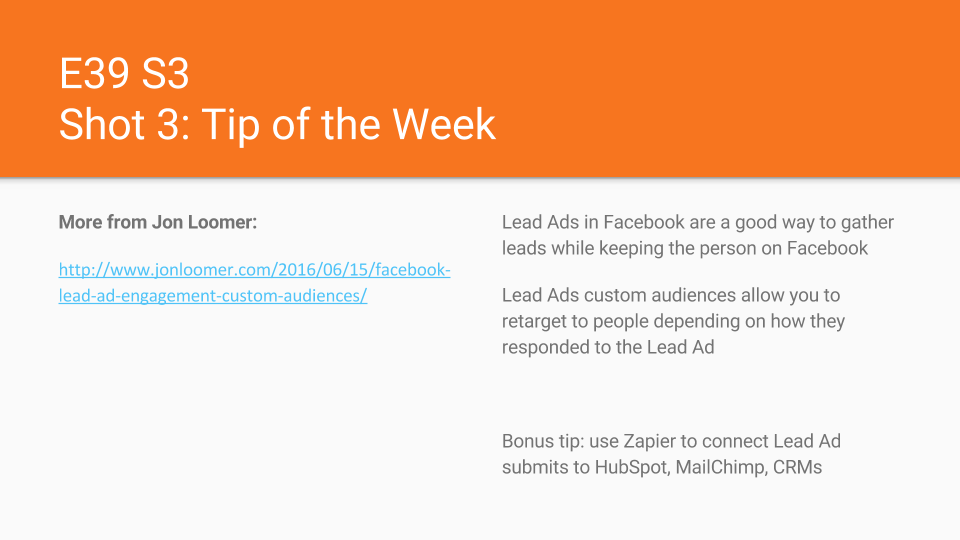
Craig: All righty, on to our Tip of the Week and more from Jon Loomer. You know, sometimes I think we could just make a show where all we do is talk about Jon Loomer, Jon Loomer tips and Gary Vaynerchuk.
Ian: And Facebook.
Craig: And a HubSpot tip thrown in for good measure. What's this week's tip?
Ian: Now this is about lead ads. So this was brought up probably three, four months ago. It was a new type of ad where you could actually click the lead information directly in Facebook. So when someone said they were interested, they'd actually get whatever details that you were requesting without having to fill anything out because you're already logged in. So I think one of the key things that I didn't know that you could do here was, your bonus tip would actually use Zapier to connect lead ads to submit into HubSpot, MailChimp, and other CRMs.
Craig: Yeah, so one of the things about lead ads...and just to reiterate to people, so you're on Facebook and then that pops up a form within Facebook, so the big appeal of it is you never leave Facebook but you can fill in a form to get a free ebook or contact us or some other activity like that. Now in the past, it was very hard to actually get that data out in an automated way. You actually had to download a CSV or you had to pay for an expensive integration. So now that's all just enabled by Zapier, that's a simple way to connect Facebook lead ads through to your systems, but the big tip from Jon Luoma is talking about the new update from Facebook is they've released this way to re-target to people who have engaged with your lead ad or your form. We're basically talking about the lead form popping up. Before you didn't. You didn't know who had opened it and you definitely couldn't re-target to them. But now you can. Someone's opened the form, maybe they didn't submit, they just closed it. You can retarget to them because it's just the people that didn't even fill it in, and then other people that did fill it in, you can immediately re-target to them with something else, another offer.
Ian: Yes, fantastic.
Craig: We say it every week don't we, "Facebook, Facebook, Facebook," and it's not just B2C, it's B2B. These are the tools are coming. This is the way that people like to engage. So grab these tools, work with them, and use it now while the window's there, window of opportunity's there.
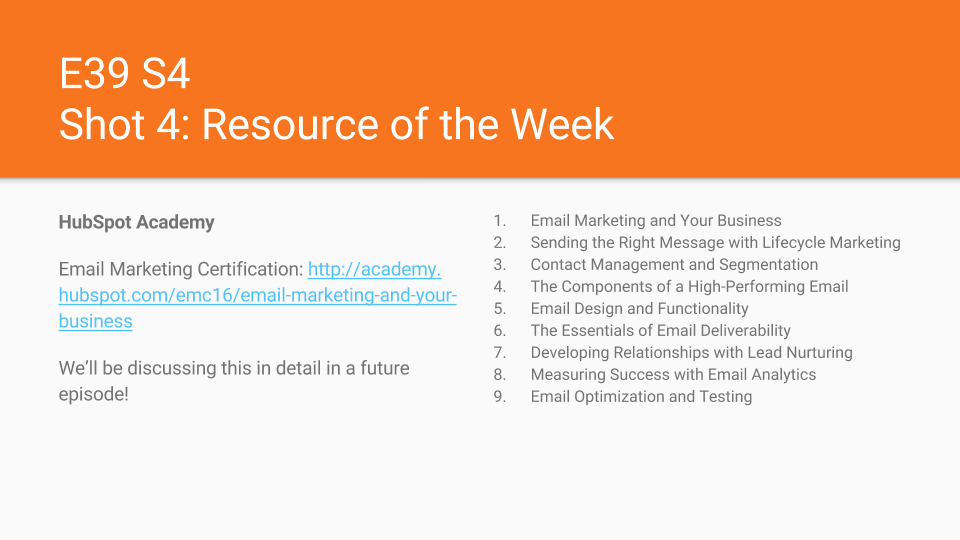
All right. Onto our Resource of the Week, and we're just briefly gonna mention this because we're actually gonna unpack this in detail in a future episode.
Ian: Yes, and this has to do with email marketing certification that HubSpot has had out for a couple of months now. It was in a beta phase and now it has gone live to everybody, but it's fantastic, you know? I think one of the things that I thought about it, it wouldn't be that detailed but it is very, very detailed. Some of the things it discusses about email marketing in your business, sending the right message with life cycle marketing, contact management and segmentation, really important. The components of a high-performance email, what is that, you know? How email design functionality plays in? What is deliverability? And how do you develop relationships with lead nurturing effectively? And then, you know, measuring success with email analytics and optimisation and testing.
Craig: Yeah, it's a very....
Ian: Test and measure, Craig.
Craig: Test and measure, as we love to say. It's a very comprehensive course. The reason we've linked to it here is because there's actually just a public link, so you can go and do all the training.
Ian: That's right.
Craig: You don't necessarily need to be logged into HubSpot. You do if you do the exam, of course. But, yeah, it's all available there. The other thing I'll say about this course is that it's almost vendor-neutral or vendor-agnostic.
Ian: You're right.
Craig: So there's, in fact, I think there's not even really a mention of a specific HubSpot feature in the entire course and it's definitely not in the exam, nothing about that. So you can apply this to any email platform that you're using that has a reasonable level of sophistication.
Ian: And why is it important? Because email has the highest return on investment for your marketing spend. So generally it's about for every dollar spent, you get between $38 and $43 back.
Craig: Yeah. Well, the caveat: when it's done right.
Ian: Correct.
Craig: And this is why the course is so good, because if you're actually doing a bit of email marketing and you're doing it, you know, lazily and getting very little return, then this is the course for you. If all you're doing is pumping out a monthly newsletter and nothing else, no nurturing...
Ian: To everybody.
Craig: Yeah, to every one...Not even segmented, this is the course for you. It's excellent, highly recommended, and we're going to unpack a few of those points.
Ian: Now on to shot five, Craig, which is your Opinion of the Week, which is importance of marketing attribution.
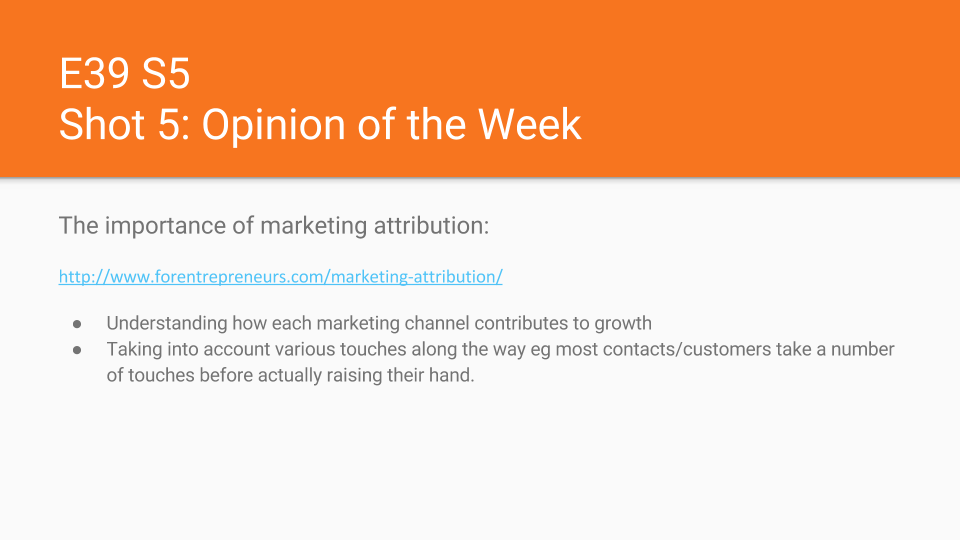
Craig: Yes. Now this was a really good article on forentrepreneurs.com, we've got a link there...and the whole topic of marketing attribution or attribution marketing is compelling and a differentiator. I think we're seeing people start to realize how important it is to work backwards to find out which channels, which marketing channels, are actually contributing to growth. Now this is an in-depth article. It's not HubSpot-specific or anything. It's actually, if anything-specific, it's more related to SaaS companies, a financial service company, but it applies equally across B2B businesses.
Ian: Now I'll tell you, when they say, "What is marketing attribution," it is, "Are you spending your money wisely?"
Craig: That's it, that's it. It's all about actually measuring or being able to measure the touch points along the way, because often we just take the last touch point, "Ah, they just finally came to us via AdWords, filled in the form. Ah, it must be AdWords." And then...or we might say they initially came via something and we miss all the touch points in the journey along the way.
Ian: Yeah, absolutely. I think that's really important to understand and I think as time has gone on, it's become more complex because there are different devices we use, different channels we use, and all of this has to all play a part in the attribution that we give it because it's all steps along the way to converting or talking to the customer, so I think that's really important that people understand that.
Craig: Yeah, and some of the interesting items that they cover in that article...I'm just thinking about what if they're offline points...and so it's an interview style article talking with some of the CMOs who've led big companies like Zendesk and Slack and others about how they attribute marketing channels back along the way. They have some great ideas like how you use coupon codes selectively to identify where they first found out about you, and if your market's big enough, how they would selectively do specific marketing pieces in certain locations just to see how that drove it because they might mean nothing. It may be...say, it's a billboard, for example, just driving a particular behaviour in a specific location, we did see email people sign up there than elsewhere and therefore that was a way of validating. And just how they think about this. Now we're actually going to cover in the next two points just some very simple ways, but just thinking about that whole big picture, that's the future, that whole data-driven marketing side of things, but yeah, I guess some of the simple ways that we can get started on that. First one, I guess, is HubSpot.
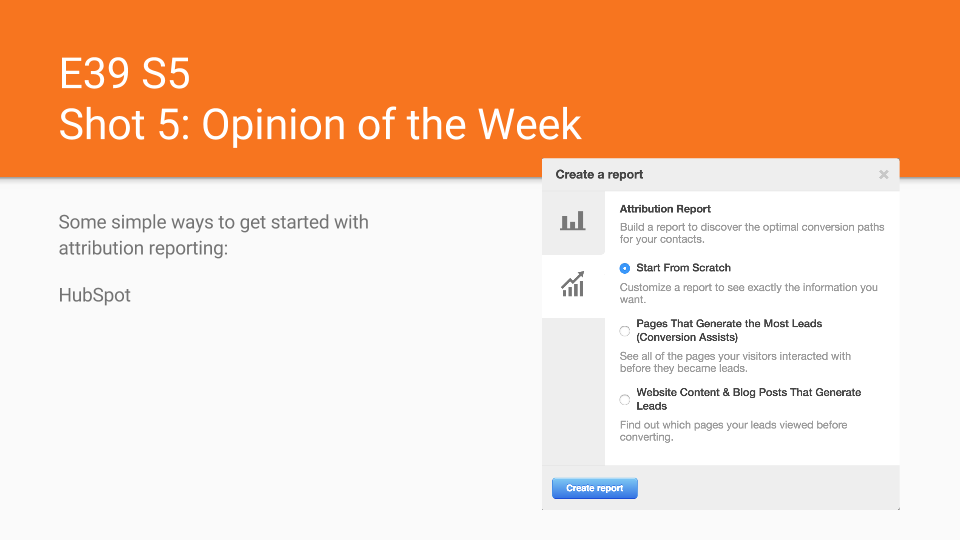
Ian: Yes, about attribution reporting, right?
Craig: Yes, even in the pro version, they've got some very simple attribution reporting functionality there and we've just included a screenshot in the show notes, but yeah, you can basically look at pages that generate the most leads or web content that kind of generates leads to get attribution from that. So it's less about, "Oh, was it Facebook," because it wasn't...it's less about the source but more about the actual behavior.
Ian: And in the next one, you were talking about Google Analytics, Craig.
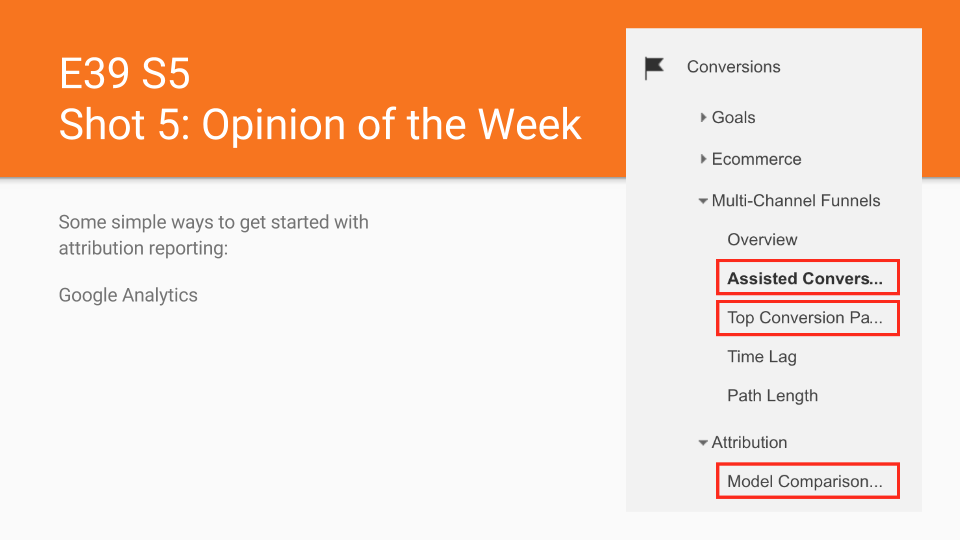
Craig: So I think this is another simple way just to get started with attribution reporting and just from the very basics, just looking at things like the paths that they go along and Analytics has this assisted conversion report, so it kind of does an average of all the ways that they came. It could be AdWords, it could be social, it could be direct, it could be organic, and just kind of giving them a percentage, a portion of what contributed to conversion.
Ian: Yeah, now Craig, for to have this in Analytics, do you have goals set up?
Craig: Ideally you should have goals, that's right. And I guess that's probably where we should've started. If you don't even have goals on your site...we've covered this in previous episodes.
Ian: We have.
Craig: Yeah, but that's always a good reminder. If you don't have goals, if you don't actually have a goal set up, then how do you actually measure whether it's been successful?
Ian: That's right. I think even with your goals, even if you do it, I would encourage you to put...even if it's not the right value, put a value beside the goal. Even if it's $1, if someone fills out that contact form, put $1 in the box because that will really help you understand and over time, drive really important behaviour because I think it's that whole 80/20 of, you know, are you actually putting your money in the right place and are you spending time optimising the right things, right? So if you know that at the point of, if someone's buying something, if they're spending money on that page, and you know that the goal value is, say, $10 and a contact form is $1, then you'll spend more time optimising the page where they're actually about to buy something.
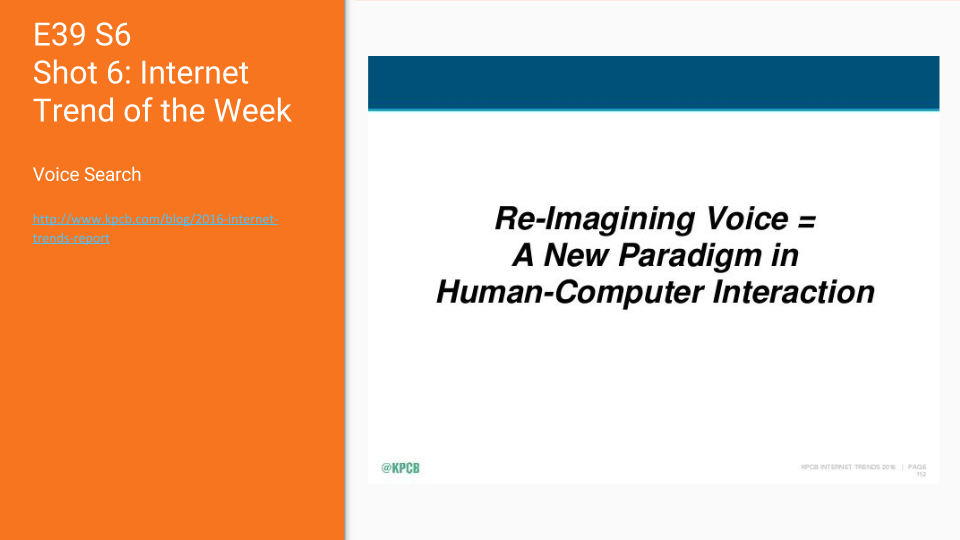
Craig: Excellent point. All right, on to shot six, Internet Trend of the Week. And we started this last episode, in fact probably two episodes ago, looking at Mary Meeker's study "Internet Trend Report for 2016". We're gonna spend a few minutes now just going through yet another interesting finding from that and that's all around voice search.
Ian: Yes, Craig, now I think this is fascinating because as you understand, voice is playing a big part. So 20% of search now on Google is actually voice-related. So people are actually picking up their devices, even sitting at their desks, clicking that little button on the voice search and going, "Craig, can you tell me where to find the best pizza in Sydney?" Right? So people are actually asking these questions and it's becoming readily a bigger thing. And as you've probably seen even in the next version of Mac OS...
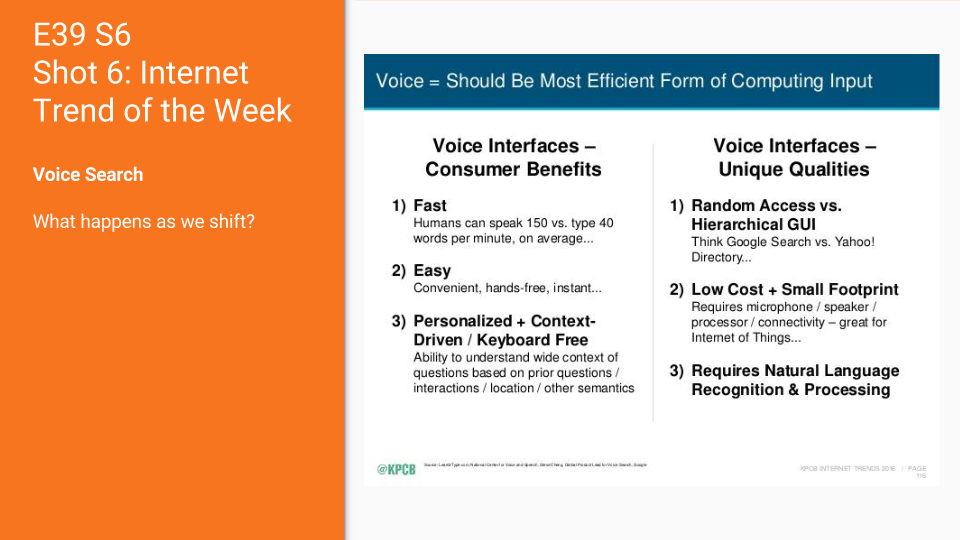
Craig: Yes, that's right.
Ian: ...there's going to be Siri, right? So you'll be able to search for things on your computer using Siri. You're gonna be using on your iPhone, in iOS 10, they're gonna be using voice to do a lot of things again, but even read out messages and talk back to you, right?
Craig: Well, I know even on our Apple TV at home, we've got the little control, you just press the button and then you talk into Siri, I think it is.
Ian: Correct.
Craig: And it finds the movies or the shows that you're after. So it's all voice.
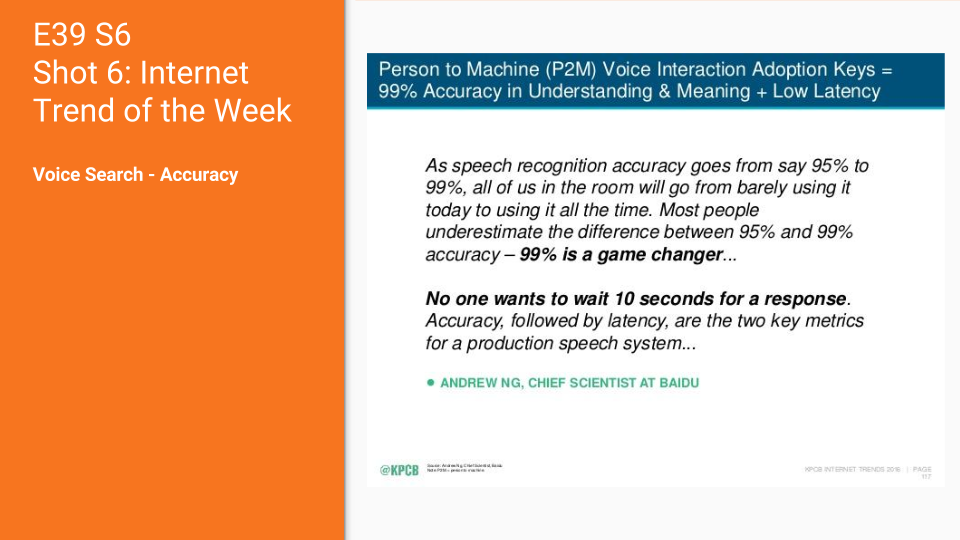
Ian: Yeah, so I think the biggest thing that stood out to me in this report is that you're reimagining voice and it's a new paradigm shift, right? So the way people behave is changing and how they behave and the quick access to information, the way it's gonna change. So we're gonna talk about that and we understand on the next slide is that voice interfaces and voice, so what are the qualities? Like, it's fast, easy, it's personalized. And one of the things that really stood out to me, it's context-driven, and I think that's really the key. It's the ability to understand where people are in their journey and the kind of questions that they ask. So thinking back to our buyers' journeys, Craig, if they're at the start, someone's question is gonna be very different to the someone who is in the process of making a decision about a product or a service and the questions they ask. Because as they're going down the value chain, they've informed themselves, they've learned, and they ask more educated questions. So I thought that was really interesting.
Craig: And I guess part of this is really around how Google's doing a lot of that interpreting of things as well and maybe Siri and these other, I guess, interfaces to it as well. That whole context, do you think it's Google that's doing that for you? Or do you think we can still be proactive in the content that we write, making sure that it matches the context and with keeping voice search in mind?
Ian: Yeah, absolutely. I think we have to think about that now, think about the content but also the context of what we're talking about. And I think that is gonna grow more and more as we get...and I think really understanding your buyer is gonna be the real key. Now another big thing that dives into this is the accuracy, so you'll notice that one of the things for this to work is that accuracy has to improve and also speed. So you'll see they talk about low latency here, that's also very important because no one wants to wait 10 seconds for Siri to respond and tell you what's going on.
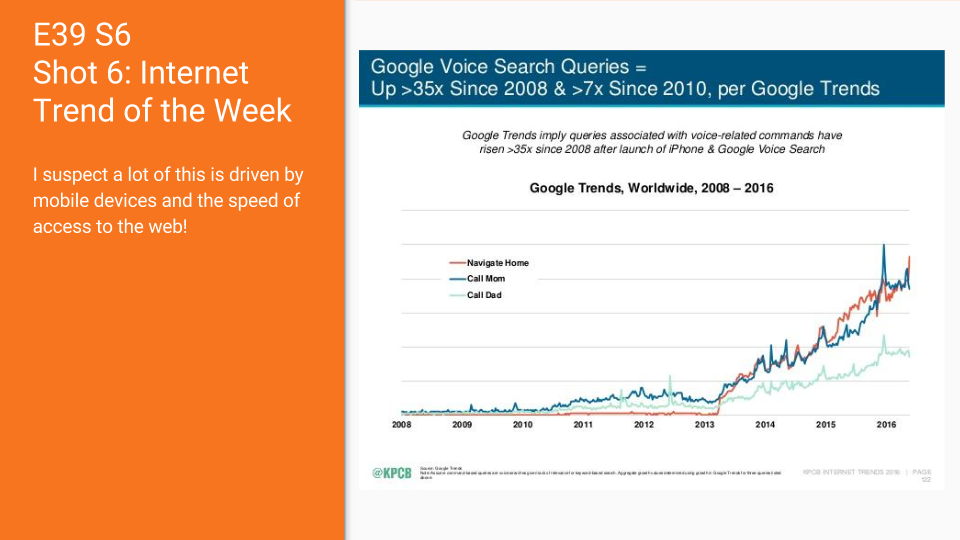
And as accuracy grows, more and more people will jump on and they will be using voice search. I know in Google Partners, for example, every time we have something, they talk about voice search and they have been doing so for the last two years and it's quite interesting because obviously it's something they work on every day, it's something they're always looking to improve, and as they shift devices and go into cars and so on, like this transcends computers and phones but goes into home devices, cars, lots of other places which we have not even mentioned and I don't know where it would be, but that's what's gonna happen. It's just gonna be driven like that.
Craig: Yeah, and I think that's right. This is the important point. There's these kind of hurdles at the moment, so the accuracy's not quite there and the latency causes slight disgruntlement by the users. And the point out of the report is these are being fast solved. So if you think voice search is still years away because of these hurdles, think again because they're being solved very quickly.
Ian: That's right.
Craig: And that's why voice search is rising so rapidly. You can see it taking off there now. We've got a screenshot of this, but just for people listening, it's basically from 2013, it's just started taking off, you know? Massive trajectory. And we're just about to see that ramp up yet again.
Ian: Absolutely. And I think what's interesting in this graph, Craig, that you see is that what are the terms, right? And this is from Google Trends, "Call Dad" is at the bottom, but still increasing. "Call Mom" is pretty much at the top. And "Navigate home," which is really interesting because...
Craig: Real activities, yeah.
Ian: They're real activities, right? And so people would go, "Well, I wanna get home." So I think it's interesting like I often now, when I get in the car and it connects to the Bluetooth, you see your phone says, "Oh, it's like 15 minutes to get home." Like, how do you know it's 15 minutes to get home? But again it's what people want to know because they clearly from this picked up that people want to know how long it takes to get home or take me home.
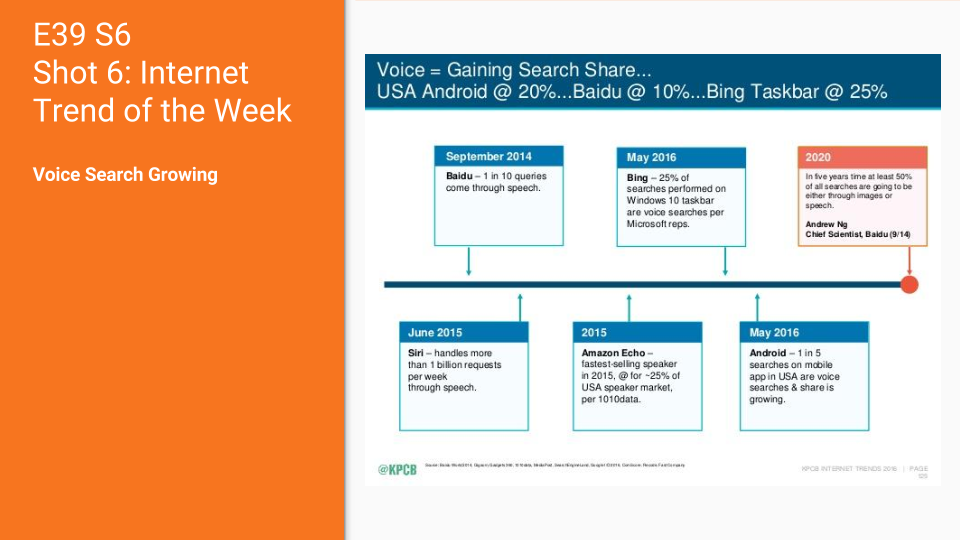
Craig: Well, the whole point of this though is...because you might be saying, "Well, hang on. I'm a marketing manager, I'm not optimizing for the term "Navigate home." No, the point is this is what people will naturally use as their communication preference. So if they're doing that with everyday activities, that's how they're gonna wanna interact with you as well. So it'll affect all industries and contexts.
Ian: Correct. Now finally, Craig, there's an interesting timeline here about how it's really gaining share and what things are doing. So one of the things I wanted to highlight was that, if you look on...I'll talk about this..there's kind of four interesting points. There's obviously Siri that was introduced. There is Baidu, which is another search engine. There's the Amazon Echo, so this is a product that Amazon sells, which you pretty much keep on your kitchen bench and you can say, "Hey, Echo, tell me what the weather is today." So it'll go to the web, it'll find out what the weather is today, and actually talk back to you. And I've seen that being advertised on TV in America.
Craig: Right, okay.
Ian: Which I think is really interesting. And what I found, another interesting thing is obviously Bing, which we don't talk about much of. But 25% of searches performed on Windows 10 task bars are voice-activated voice searches which I think is pretty big.
Craig: Right.
Ian: So I know a lot of people don't talk about that, because we talk about Siri and Apple, but even on Microsoft, on Windows, people are doing it.
Craig: Even on Microsoft. So the thing to point there is that, yes, Windows 10's been doing that for a while now.
Ian: Correct.
Craig: Voice search, and Mac OS is just getting Siri now.
Ian: Exactly.
Craig: So like...everyone will talk about how it's an innovation for Apple, but it's been on Windows for ages already. So but yeah, the point is this is...
Ian: It's not a fad. It's not a fad.
Craig: This is becoming the norm.
Ian: And I'm gonna put something out there. So this is Andrew Ng from Baidu, he's a Chief Scientist, and this is in 2020, he's saying, "In five years' time, I think 50% of searches are going to be either through images or speech." Now that's a bold statement, but I don't think he's far off. And I guess around 2020 we'll come back to this episode and we'll be able to tell.
Craig: Oh look, I wouldn't mind betting it's quicker than that. And just because my behavior, when we got our Apple TV at home and there was the Siri button, my first response was, "Oh, novelty. No one'll use this." We use it all the time. It's just so natural now. And I guess Apple TV is...I guess there's no keyboard to put it in anyway.
Ian: No, exactly.
Craig: So they had to figure out, but it's obvious there. But yeah, every device and things like that. But what's interesting about this...we were discussing this before the show...okay, so in marketing terms, that's great because all of that kind of stuff is, "Well, Google's taking care of that and Amazon Echo is taking care and Siri is taking care of that." What does this mean for marketing? Because it's great, we can see this trend, but how should we respond to that? And I guess the two ways to think about it, one is them getting to your site. So as we mentioned earlier, just about being aware of the context, the buyer's journey, writing content for it that you know will be useful for someone that has voice searched for it. So they've got a particular way behavior probably that's more conversational and more interactive. But then the second thing, which these slides didn't really go into but we were discussing, it's just around, "Well, okay, that's them getting to your site or your app or your asset, your property. How do you actually make your site better for voice?"
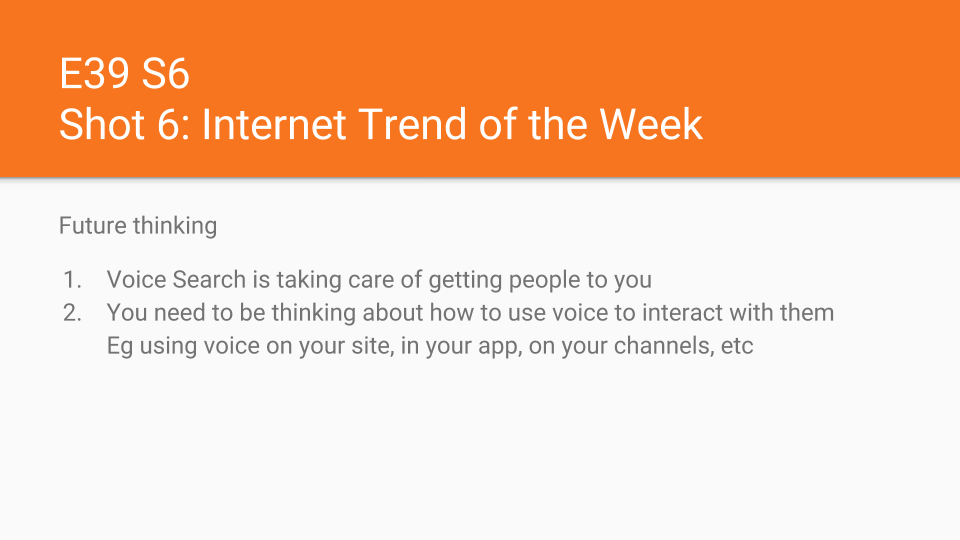
Ian: Yeah.
Craig: And I'm not seeing anyone really doing this yet, but...
Ian: They're not?
Craig: ...we're just thinking, like, you go to a site, right? You've used Google Voice Search to get to the site, but you're in the site, surely you just want to use voice search or voice interaction with the site itself to do stuff.
Ian: Exactly. Yeah, so I think the next phase will be like, "Oh, can you read this page to me," click a button. Or I have seen and I tested this out a couple of years ago, it was like, you could leave a voicemail on your site. So someone presses the button, leaves a voicemail, gets sent to you as an email or as a WAV file, then you can respond to that.
Craig: Well, that's exactly...on a contact page. And so you go to a site then a contact page. You don't want to have to then tap, tap, tap, tap, fill in a contact form. You just wanna press...you wanna hold the press button.
Ian: Exactly.
Craig: "Hi, this is Craig. Please call me." And the site just knows because you were on your mobile when you did it, so it knows a little bit about your mobile. And then they'll just call you back or contact you. That's the interaction people are gonna want.
Ian: Yeah, absolutely. And I think that's the things we need to be aware of, just keep in mind as we move ahead, this is what's happening. And just be aware, what's going on in industry.
Craig: All right. On to shot seven, our Community Item of the Week. Did you see this, the HubSpot Pitch-Off? I saw this. This is so cool.
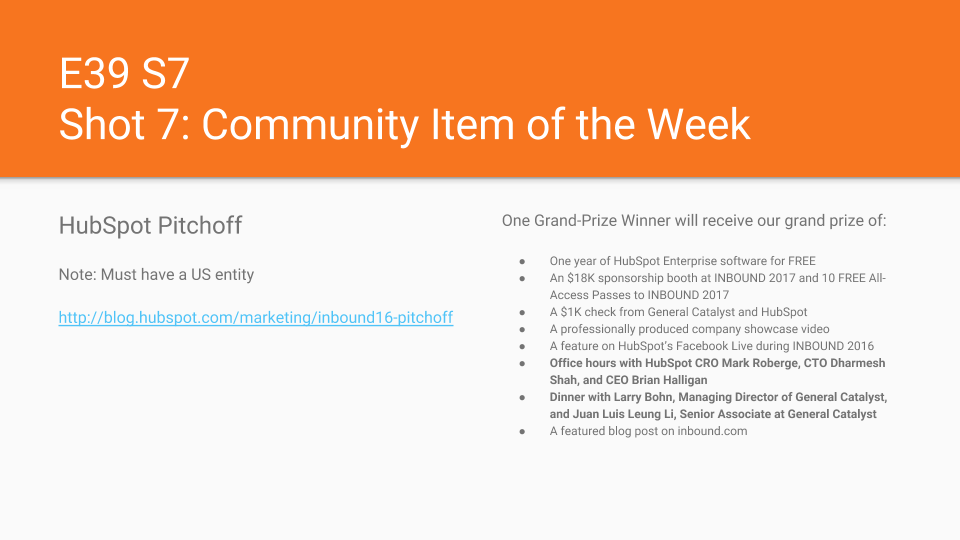
Ian: So now I thought this is cool but I think the prize is fantastic, Craig. Like obviously they'll give you HubSpot Enterprise and all this other stuff.
Craig: Well, hang on, hang on. We'd better explain what it is first.
Ian: Yeah, go on, Craig.
Craig: So the HubSpot Pitch-Off...because I only heard about this today..it's a big thing.
Ian: It is. It's massive.
Craig: I hadn't actually heard about it, but it's basically a pitch-off for startups. So this won't apply to traditional companies if you're a marketing manager, but if you're a marketing manager in a startup and you're still in the formative stages, so less than three million in revenue per year but you're growing, and you want to pitch your product or service to a fairly responsive audience and some judges at Inbound, then this is the competition for you. Now you have to have a U.S. entity as part of your structure but most people can organize that. But yeah, tell us about the prizes because this is fantastic.
Ian: Yeah, so you obviously get access to Inbound, you get tickets to Inbound, you get Enterprise for you, which is massive. You get 18K in sponsorship. A booth at Inbound 2017. But one thing I really saw and that really got me was office hours with HubSpot's CRO Mark Roberge, Dharmesh, and Brian.
Craig: Yeah, now Mark Roberge...I think CRO is Chief Revenue Officer.
Ian: Yes.
Craig: He's the one that did most of the Inbound sales certification. He's written that book, "Sales Acceleration Formula," I think which we reviewed a couple episodes ago.
Ian: Yes, exactly.
Craig: He's amazing. He basically grew HubSpot from five people to whatever. Dharmesh, well, you know, personally inaudible 00:25:44]. And Brian, [inaudible 00:25:46].
Ian: Yeah, and, you know, that alone, that prize is gold.
Craig: It makes me want to go and create a startup just to enter this. But look, it's a fantastic opportunity for anyone inside, and I've got a number of friends who are in a startup and they're looking at HubSpot, part of their marketing, that whole growth hacker approach. This is a fantastic opportunity for you to work on your startup, pitch in front of people, and get access to these people, if you win. I wish they'd do a competition for agencies called The Agency Pitch-off or something like that.
Ian: Anyway, it's there.
Craig: There it is, yup.
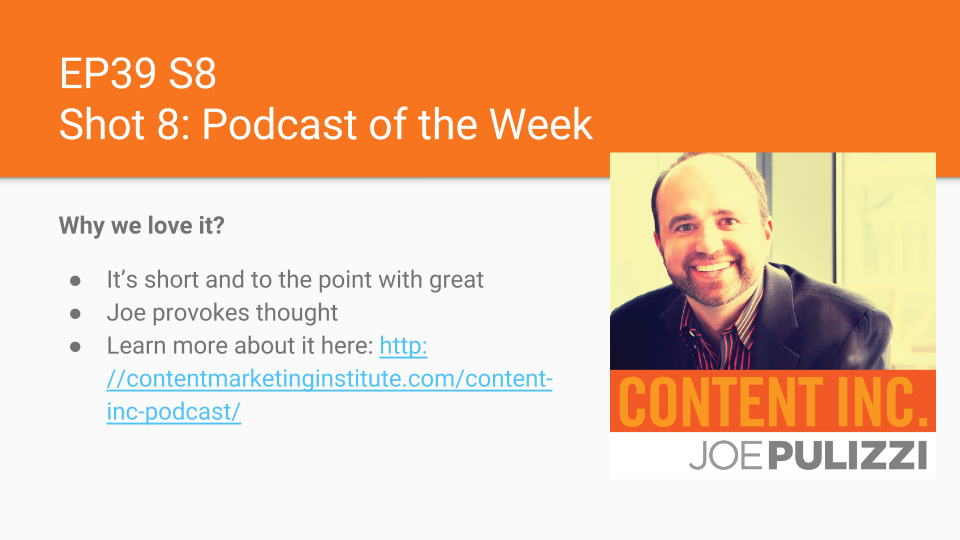
Ian: All right, now our Podcast of the Week, Craig, is...
Craig: The Content, Inc podcast, Joe Pulizzi.
Ian: Yes, I've been listening to it and enjoying it. It's usually about three to four minutes long. I think we should go and listen to it.
Craig: It's really good. And if you think, "Oh, didn't I hear about this a couple of episodes ago?" Yes, you did. We're mentioning it again because it is so useful. All right, let's do App of the Week.
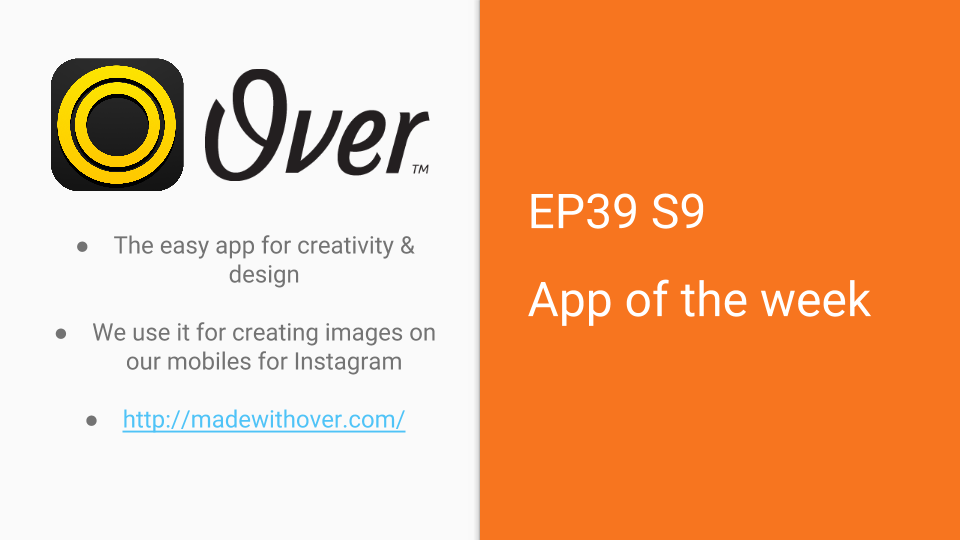
Ian: App of the Week is Ova. Now this is an app, it runs on Android and iOS and it's an app I've used quite a bit over time to actually create little stuff for Instagram that we put out there.
Craig: Okay.
Ian: So I do that for Search & Be Found and for HubShots using that app.
Craig: So explain it a bit, because I haven't used this app.
Ian: Okay, so it's an easy app for creativity and design. So you can get a picture, you can add filters, you can put text on the top of it.
Craig: Right. Right.
Ian: You can do all sorts of funky things, but really great. Easy to use. Well, it's one of the ones I've used for a while. I tested quite a few out but this one that I keep coming back to.
Craig: So a graphic design app on your phone, but wouldn't you just use Photoshop on your desktop, Ian?
Ian: No, Craig.
Craig: It's all going to mobile, isn't it? I'm amazed at how many graphics apps there are on mobile and they're so useful.
Ian: Absolutely, and I think that's the key. It's been one of the apps that I have found really easy to use and to get a great result. And finally, Quote of the Week, Craig.
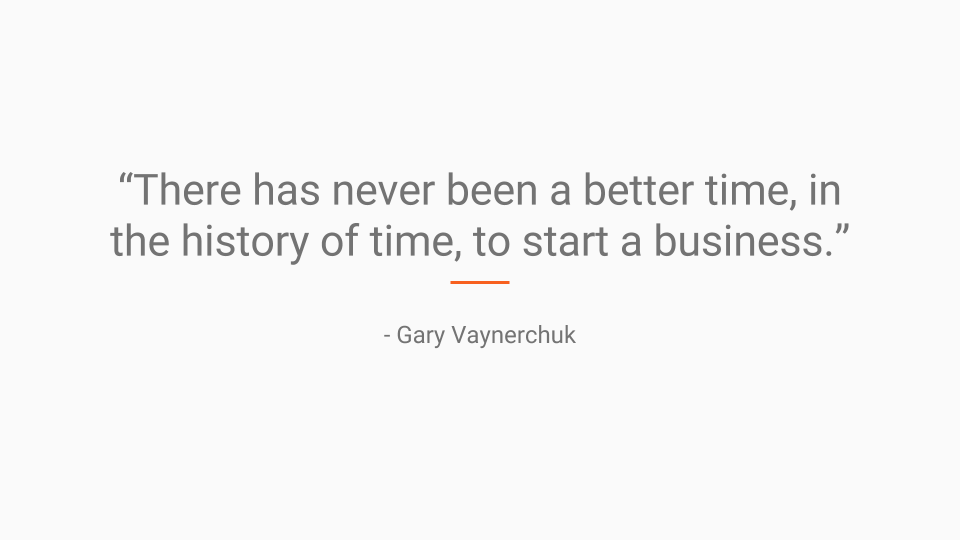
Craig: We should just make this the Gary Vaynerchuk Quote of the Week section, but yeah, he's famous for saying this actually, "There's never been a better time in the history of time to start a business." And he explains this in his personal branding course, ust about the opportunities we have now.
Ian: Absolutely.
Craig: He likes to say, "Compare this to your grandparents. Did they have opportunities we have now for starting and growing a business? No."
Ian: No. All right, remember, as we always say, test and measure.
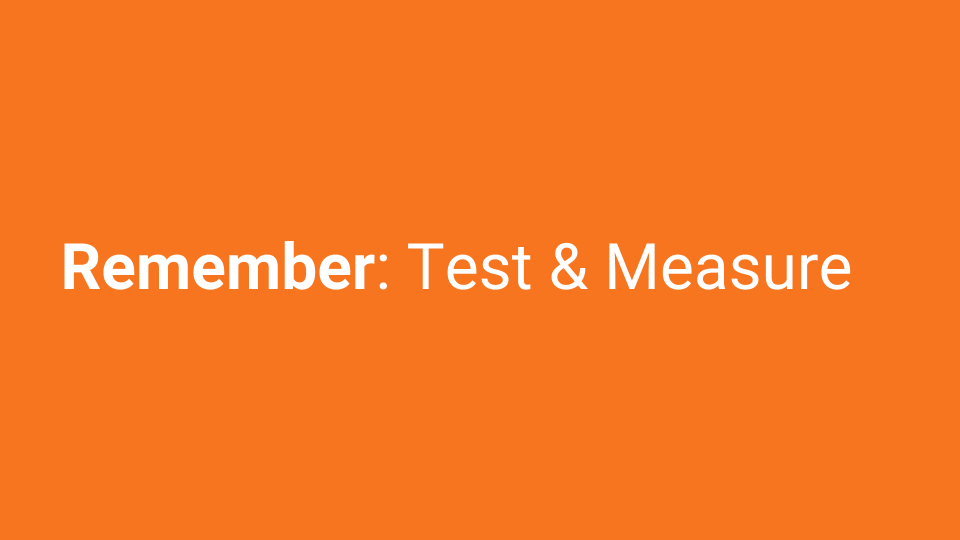
Craig: Test and measure. Alrighty, well, thanks for listening, everyone. That brings us to the end of the show. We'd love your feedback as always, so please drop us a note on our contact form on the side or an iTunes review. We'd love that.
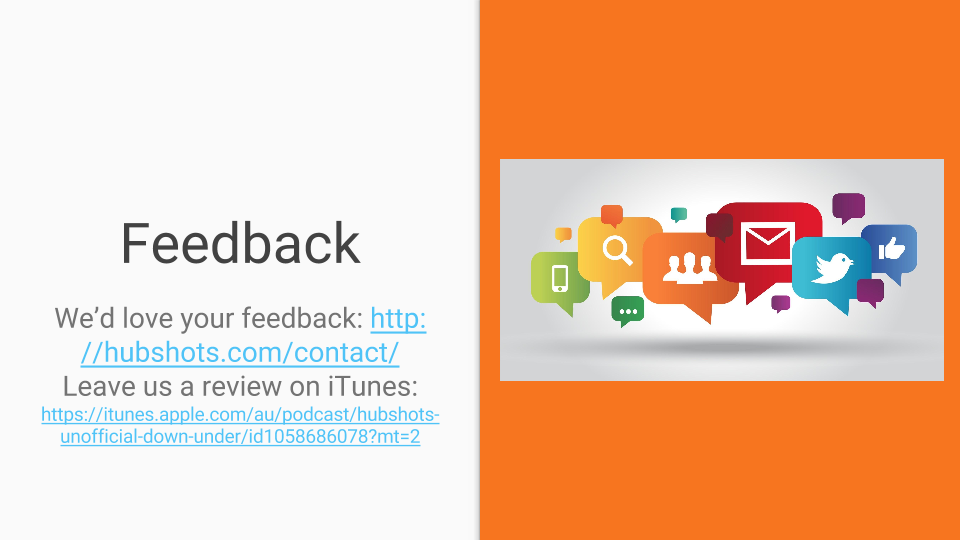
Ian: Or, you know, have a conversation with us on Instagram or Twitter and it'll be a great place to connect. And don't forget, if you want to be part of the WhatsApp group, please fill out the form on the website and let us know your number.
Craig: Alrighty. Thanks, Ian. I'll catch you again next week.
Ian: Thank you, Craig.
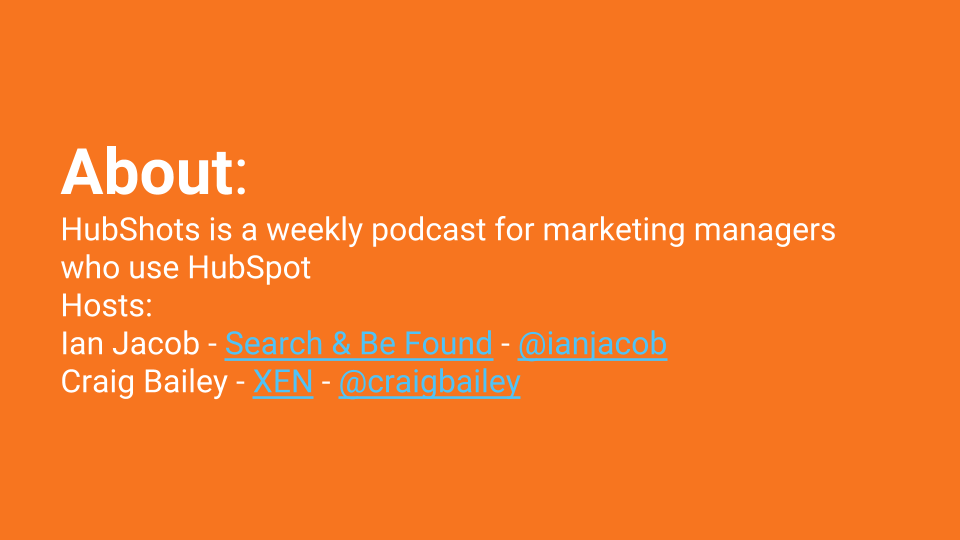
Craig: Hey, there. Thanks for listening to this episode of HubShots. For show notes and the latest HubSpot news and tips, please visit us at hubshots.com.
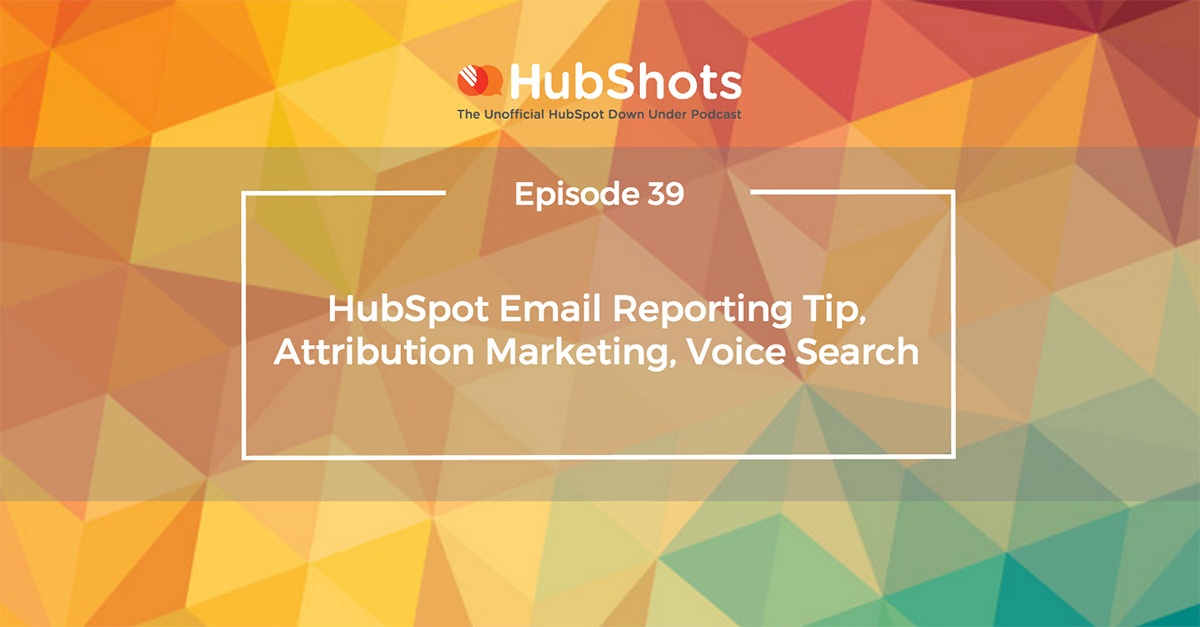
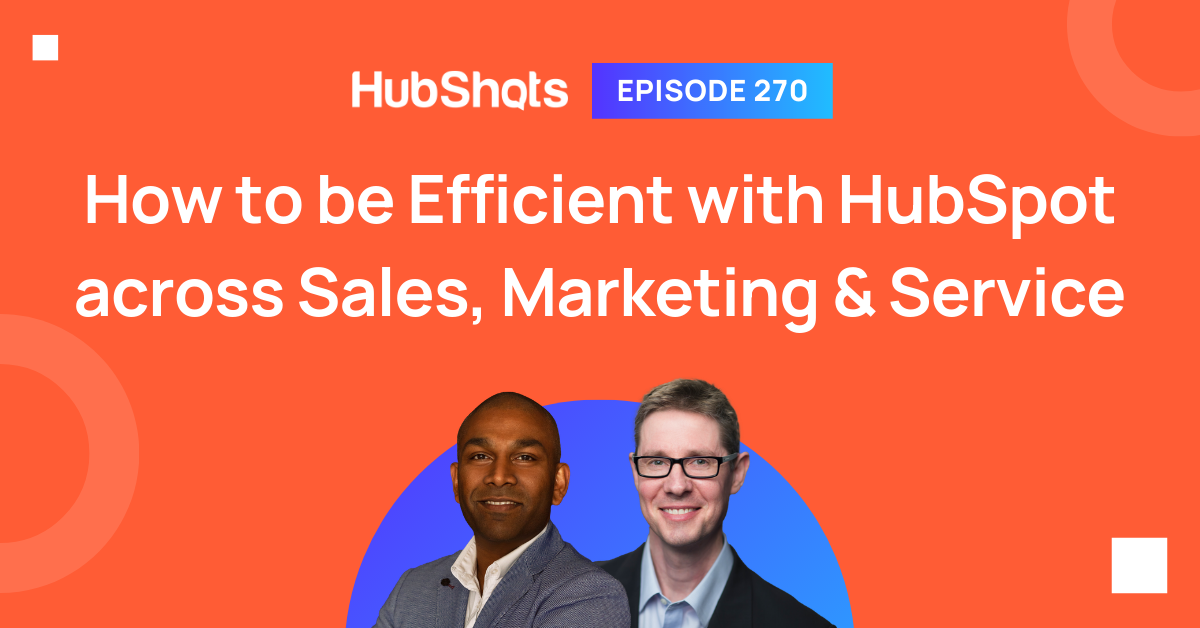
HubShots Episode 270: How to be Efficient with HubSpot across Sales, Marketing & Service This edition we dive into: Thoughts for 2022 Having...
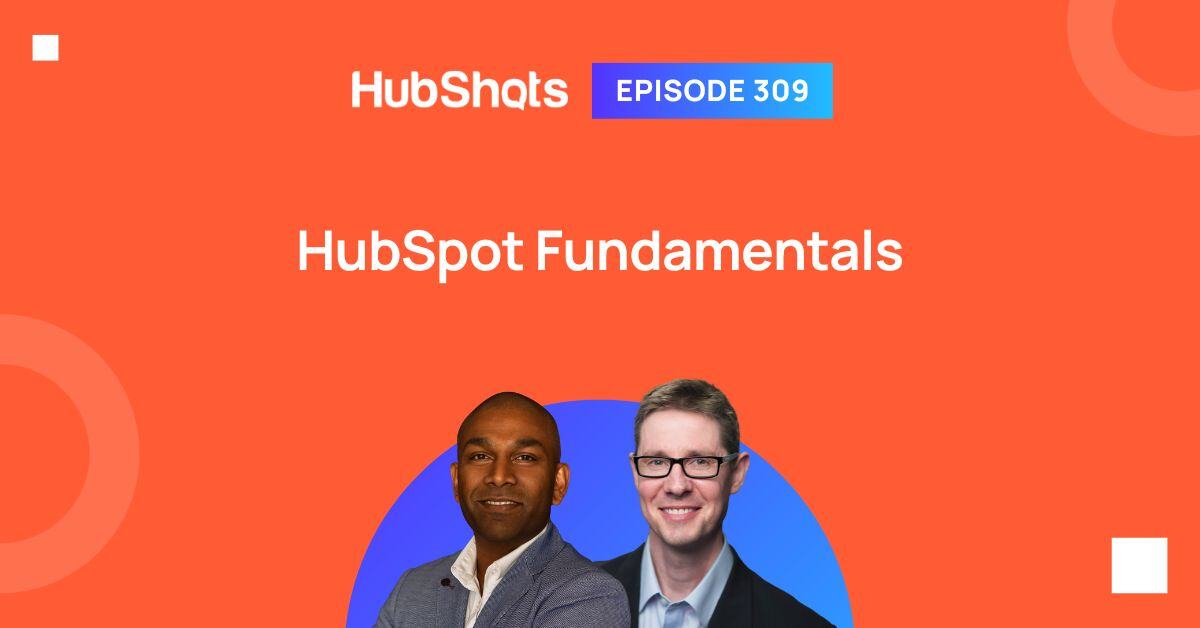
Welcome to HubShots Episode 309: HubSpot Fundamentals This edition we dive into: Quick Wins for new HubSpot Users CRM fundamentals Marketing Hub...
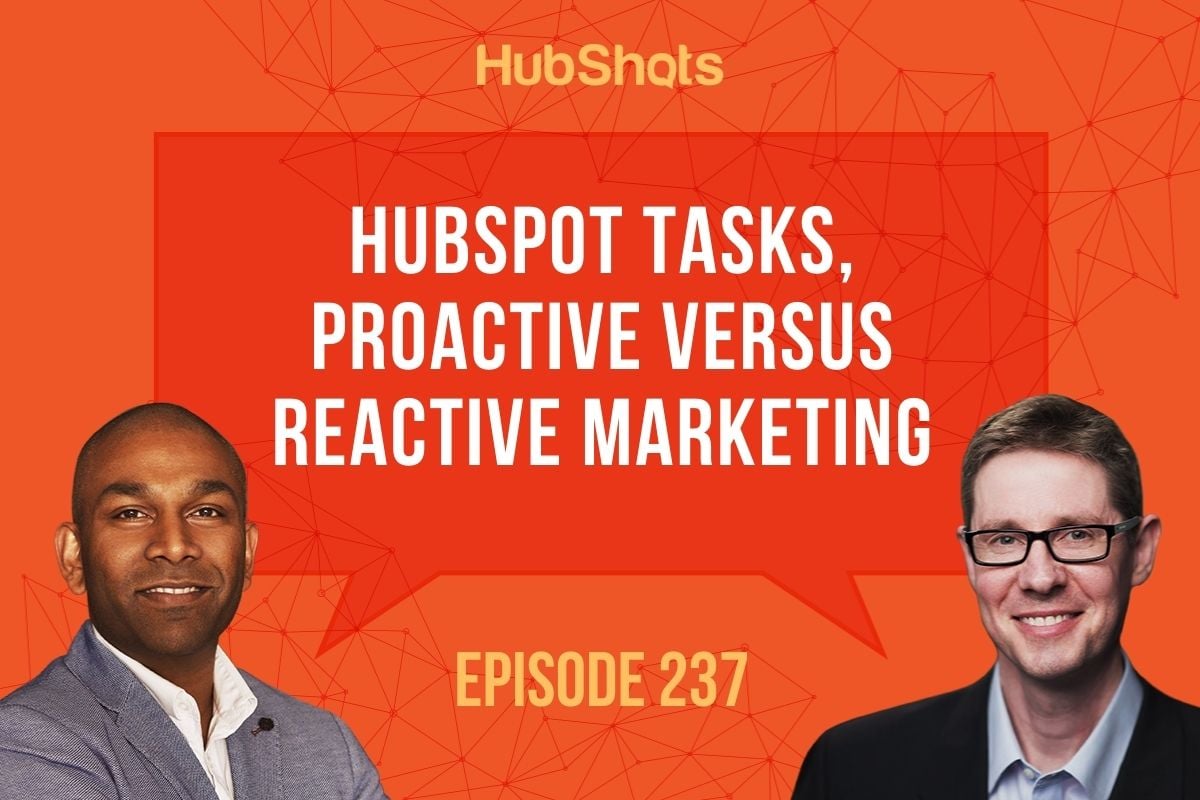
Welcome to HubShots Episode 237: HubSpot Tasks, Proactive versus Reactive Marketing This edition we dive into: Facebook versus Australia follow up
